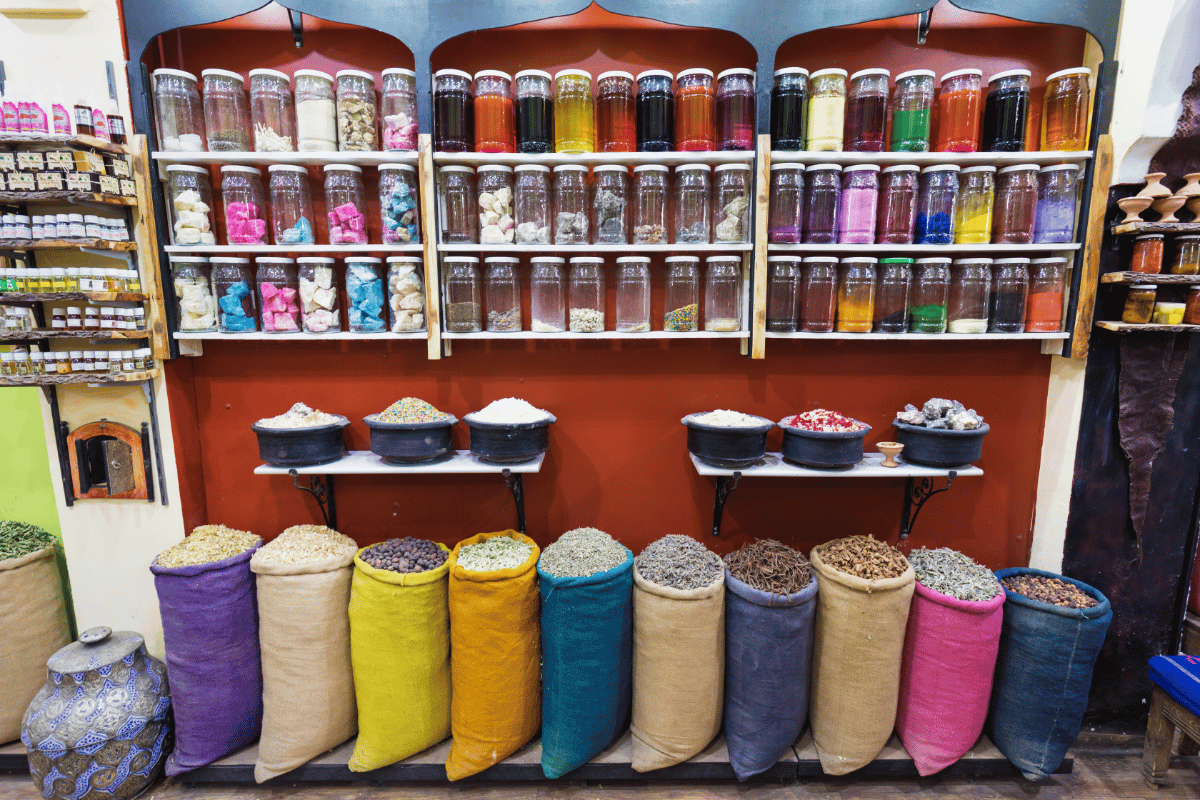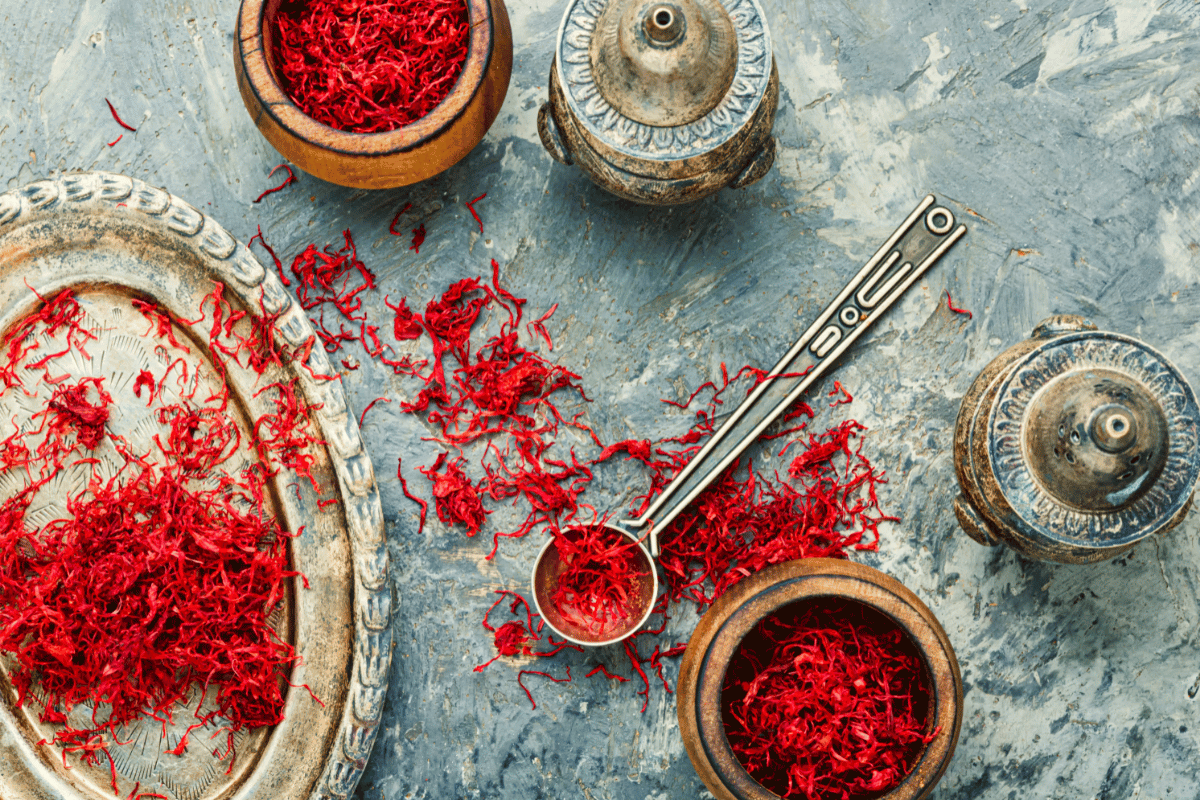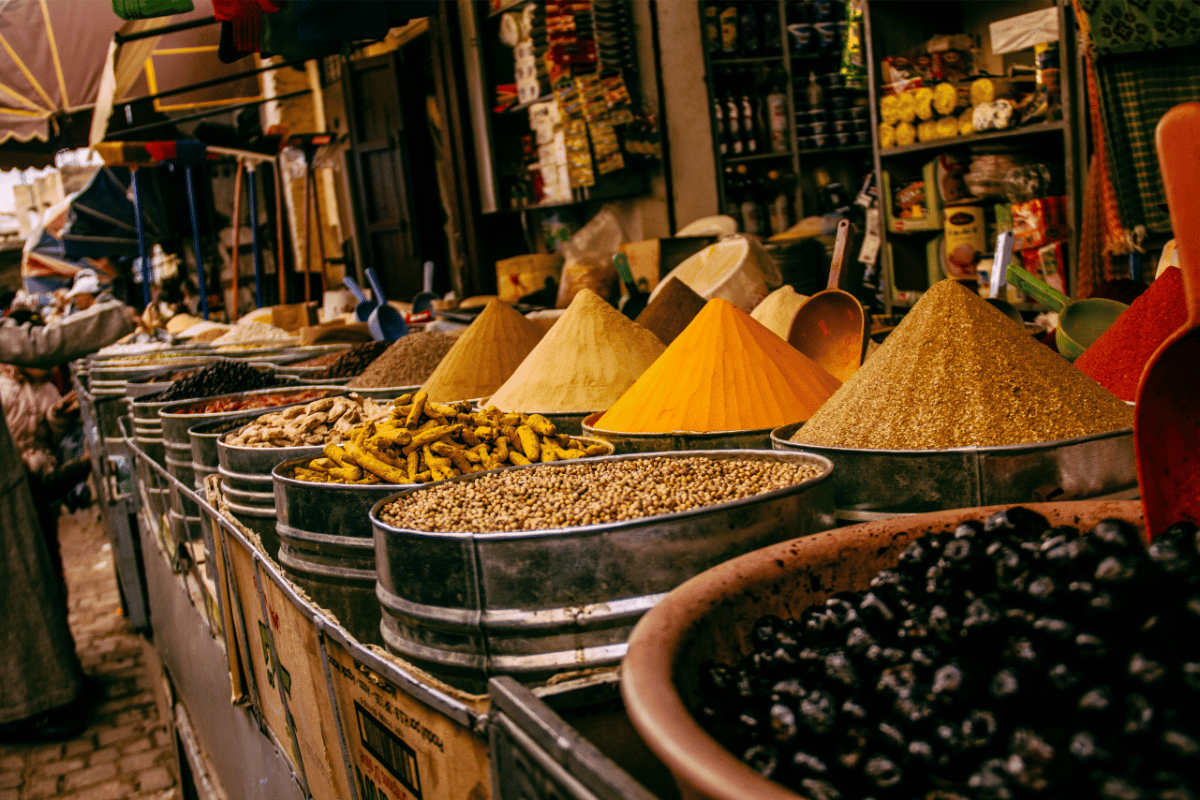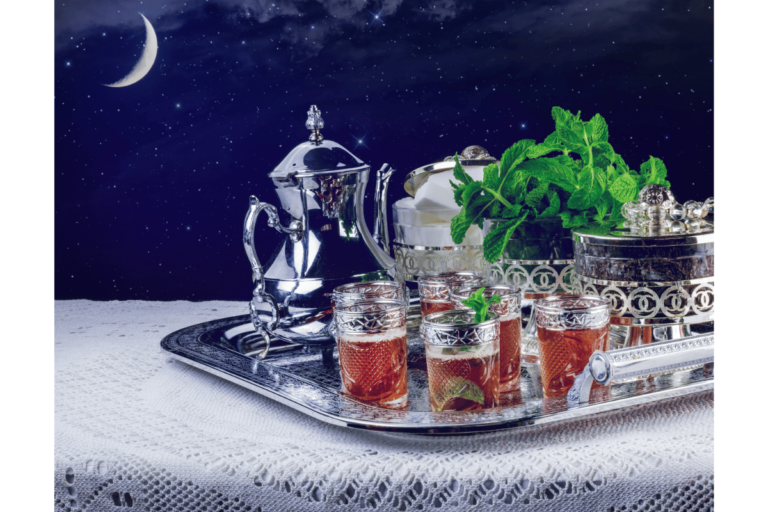Do you ever wonder what makes Moroccan cuisine so incredibly flavorful and aromatic? The secret lies in the vibrant and diverse world of Moroccan spices. These exotic seasonings have been an integral part of Moroccan cooking for centuries, adding depth, complexity, and a touch of magic to every dish.
In this article, we will take you on a journey through the rich history of Moroccan spices. We will explore the key spices that are essential in Moroccan cuisine and delve into their unique flavors and aromas. You will discover how these spices are used in traditional Moroccan dishes to create unforgettable culinary experiences.
And don’t worry – we won’t leave you empty-handed! We’ll also provide you with some tips on how to incorporate these magical spices into your own cooking, so you can bring a taste of Morocco into your kitchen.
Get ready to unlock the secrets behind the incredible flavors of Moroccan cuisine!
Key Takeaways
- Moroccan spices have a rich history and are considered integral to Moroccan cuisine.
- Spices like cumin, coriander, cinnamon, saffron, and turmeric are essential in Moroccan cooking.
- Moroccan spices offer health benefits and have been valued for their aromatic qualities and medicinal properties.
- Moroccan spice blends and desserts showcase the unique combination of warm spices and sweetness in Moroccan cuisine.
The Rich History of Moroccan Spices
The rich history of Moroccan spices is a testament to the vibrant cultural heritage and the intricate tapestry of flavors that have shaped Morocco’s cuisine. From ancient times, Morocco has been a hub for spice trade due to its strategic location along important trade routes.
The origins of Moroccan spice trade can be traced back to the Phoenicians, who established trading posts along the Mediterranean coast. These early traders introduced exotic spices from faraway lands, which were eagerly embraced by the Moroccan people.
Moroccan spices hold immense cultural significance in the country’s culinary traditions. They’re not just ingredients; they’re an integral part of Moroccan identity and heritage. Spices like cumin, coriander, cinnamon, saffron, and turmeric are used in various dishes to enhance their flavors and create a unique taste profile that is distinctly Moroccan. These spices aren’t only valued for their aromatic qualities but also for their medicinal properties believed to promote good health.
The popularity of Moroccan spices grew exponentially during the Islamic Golden Age when North African merchants dominated global spice trade routes. The demand for these precious commodities soared as they became sought-after luxury goods across Europe and Asia. As a result, Morocco flourished economically as it benefited from both domestic consumption and international spice exports.
As we transition into exploring ‘the key spices in Moroccan cuisine,’ it becomes evident that these centuries-old traditions continue to shape modern-day Moroccan cooking techniques and flavor profiles. The secret ingredient behind every delicious dish lies within these carefully selected herbs and spices that capture the essence of Morocco’s rich history and cultural diversity.
The Key Spices in Moroccan Cuisine
Explore the vibrant flavors of Morocco by incorporating these key spices into your cooking. Moroccan cuisine is known for its bold and exotic flavors, which are achieved through a careful combination of various spices. These spices not only add depth and complexity to dishes but also offer numerous health benefits. The cultural significance of Moroccan spices cannot be overstated, as they have been an integral part of the country’s culinary traditions for centuries.
To truly understand the essence of Moroccan cuisine, it is important to familiarize yourself with some of the key spices used in this flavorful cuisine. Cumin, coriander, and cinnamon are three essential spices that form the foundation of many Moroccan dishes. Cumin adds a warm and earthy flavor, while coriander brings a fresh and citrusy note to dishes. Cinnamon, on the other hand, imparts a sweet and aromatic taste that pairs perfectly with savory ingredients.
Another spice that is central to Moroccan cooking is turmeric. Not only does it lend a beautiful golden hue to dishes but it also offers several health benefits. Turmeric has been used in traditional medicine for centuries due to its anti-inflammatory properties and potential immune-boosting effects. Its unique flavor adds a subtle warmth to Moroccan dishes without overpowering other ingredients.
Lastly, saffron is one of the most prized and expensive spices in the world, but it plays an essential role in Moroccan cuisine. Known for its distinctive color and floral aroma, saffron elevates both sweet and savory dishes to new heights. It adds a touch of luxury to tagines, rice pilafs, and even desserts like honey-soaked pastries.
By incorporating these key spices into your cooking repertoire, you can embark on a culinary journey filled with rich flavors and enticing aromas. Not only will you discover new tastes but you will also gain an appreciation for the cultural significance behind each spice. So let’s continue exploring the flavors and aromas of Moroccan spices and uncover the secrets that make this cuisine so extraordinary.

Exploring the Flavors and Aromas of Moroccan Spices
Get ready to indulge in a culinary adventure as you delve into the tantalizing flavors and captivating aromas of Morocco’s vibrant spice blends.
Moroccan spices are not only known for their incredible taste, but also for their numerous health benefits. These spices are packed with antioxidants, vitamins, and minerals that can boost your immune system and improve digestion. From the fiery kick of cayenne pepper to the warm sweetness of cinnamon, each spice brings its own unique flavor profile to Moroccan cuisine.
In addition to their health benefits, Moroccan spices also hold great cultural significance. They’ve been used for centuries in traditional Moroccan cooking and are an integral part of the country’s rich culinary heritage. The combination of spices used in Moroccan dishes reflects the historical influences from Arab, Berber, and Mediterranean cultures. The aroma of these spices wafting through the air is enough to transport you to bustling souks filled with vibrant colors and exotic scents.
One popular spice blend in Moroccan cuisine is ras el hanout, which literally means ‘head of the shop’ in Arabic. This complex mixture can contain up to 30 different spices such as cumin, coriander, ginger, paprika, cardamom, and saffron. Ras el hanout adds depth and complexity to dishes like tagines and couscous.
Another well-known spice is za’atar, a blend made from thyme leaves mixed with sumac berries and sesame seeds. It has a tangy flavor that pairs perfectly with grilled meats or sprinkled on top of flatbreads.
As we venture further into our exploration of Moroccan cuisine, we’ll now transition into discovering traditional Moroccan dishes that showcase the power of these aromatic spices.
Traditional Moroccan Dishes that Showcase the Power of Spices
Experience the tantalizing flavors of traditional Moroccan dishes that truly showcase the power and versatility of these aromatic spices.
When it comes to desserts, Moroccan cuisine doesn’t disappoint. Indulge in a plate of sweet and sticky honey-soaked pastries like baklava or msemen, which are thin, flaky pancakes filled with honey and nuts. The combination of warm spices like cinnamon and nutmeg with the sweetness of honey creates a delightful balance that’ll satisfy your sweet tooth.
In addition to their incredible taste, Moroccan spices also offer numerous health benefits. Cumin, a common spice used in Moroccan cooking, is known for its digestive properties and can help alleviate bloating and indigestion. Turmeric, another staple spice in Moroccan cuisine, contains curcumin, which has powerful anti-inflammatory effects on the body. By incorporating these spices into your diet through traditional Moroccan dishes, you can not only enjoy their delicious flavors but also reap their health benefits.
Another classic dish that perfectly highlights the richness of Moroccan spices is tagine. This slow-cooked stew combines tender meat or vegetables with fragrant spices like cumin, coriander, saffron, and ginger. The result is a hearty and flavorful dish that warms both the body and soul. Whether it’s a chicken tagine with preserved lemons or a vegetable tagine bursting with colorful vegetables like eggplant and zucchini, this traditional dish will transport you straight to Morocco.
To transition into the subsequent section about ‘tips for incorporating Moroccan spices into your cooking,’ consider experimenting with different combinations of herbs and spices to create your own unique flavor profiles inspired by traditional Moroccan cuisine. By adding cinnamon to your morning oatmeal or sprinkling some cumin on roasted vegetables, you can infuse any dish with the exotic flavors of Morocco while reaping their health benefits as well.
So get creative in the kitchen and let these vibrant spices take center stage in your culinary adventures!
Tips for Incorporating Moroccan Spices into Your Cooking
Transform your ordinary meals into extraordinary culinary masterpieces with the simple addition of aromatic Moroccan spices. Incorporating Moroccan spices in everyday cooking isn’t just a delicious way to enhance the flavors of your dishes, but it also brings numerous health benefits.
The rich and vibrant flavors of Moroccan cuisine are derived from a blend of spices that have been used for centuries. By incorporating these spices into your cooking, you can add depth and complexity to your meals.
One tip for incorporating Moroccan spices into your cooking is to start by experimenting with small amounts. This allows you to gradually adjust the flavors to suit your taste preferences. You can begin by adding a pinch of cumin or coriander to rice or couscous dishes, or sprinkle some paprika on roasted vegetables. As you become more comfortable with using these spices, you can gradually increase the amount and try different combinations to create unique flavor profiles.
Another way to incorporate Moroccan spices into everyday cooking is by using them as rubs or marinades for meats and seafood. The combination of warm spices like cinnamon, ginger, and turmeric adds an incredible depth of flavor when used as a dry rub or mixed with olive oil as a marinade. Whether you’re grilling chicken skewers or baking salmon fillets, these spice blends will elevate your dishes to new heights.
In addition to their delicious flavors, Moroccan spices also offer numerous health benefits. Many of these spices contain powerful antioxidants that help protect against inflammation and oxidative stress in the body. For example, turmeric is known for its anti-inflammatory properties, while cinnamon has been shown to help regulate blood sugar levels. By incorporating these spices into your everyday cooking, you can not only enjoy their amazing flavors but also boost your overall well-being.
Incorporating Moroccan spices into your everyday cooking is a fantastic way to transform ordinary meals into extraordinary culinary experiences. Start by experimenting with small amounts and gradually increase as you become more comfortable with the flavors. Use these spices as rubs or marinades for meats and seafood to add depth and complexity to your dishes. And don’t forget about the health benefits – these spices offer a range of antioxidants that can support your overall well-being. So, go ahead and spice up your meals with aromatic Moroccan spices!

Frequently Asked Questions
What are some common substitutes for Moroccan spices in traditional Moroccan dishes?
For Moroccan spices substitutes, you can use cinnamon, cumin, paprika, and turmeric. Incorporate Moroccan spices into non-traditional dishes by adding them to roasted vegetables, grilled meats, or even in salad dressings for a flavorful twist.
Are Moroccan spices typically used in sweet dishes as well as savory dishes?
Yes, Moroccan spices are commonly used in both sweet and savory dishes. Spices like cinnamon, cardamom, and cloves add a unique flavor to Moroccan desserts. They are also popular in international cuisine for their rich taste.
How do Moroccan spices differ from other spice blends from different cuisines?
Moroccan spices stand out from other spice blends with their unique combination of flavors and aromas. Their history and cultural significance make them essential in Moroccan cuisine, adding depth and complexity to both savory and sweet dishes.
Are there any health benefits associated with consuming Moroccan spices?
Experience the numerous health benefits of consuming Moroccan spices, which have been an integral part of traditional Moroccan medicine for centuries. Boost your immune system, improve digestion, and reduce inflammation with these flavorful and aromatic spices.
Can you find Moroccan spices outside of Morocco, and if so, where can you purchase them?
Looking to find Moroccan spices outside of Morocco? You’re in luck! Local markets offer authentic blends that capture the essence of traditional Moroccan cuisine. Alternatively, you can explore online options for a convenient and wider selection, including both authentic and Westernized blends.
Conclusion
As you bring your culinary journey through Morocco to a close, don’t forget to sprinkle a touch of magic into your dishes with Moroccan spices. These little gems hold the power to transport your taste buds to exotic lands, where the rich history and vibrant flavors of Moroccan cuisine await.
Let these mystical ingredients be the secret behind your truly unforgettable meals.
With each bite, you’ll savor the legacy of centuries-old spice trade routes and the artistry of Moroccan chefs who’ve perfected their craft over generations. The key spices in Moroccan cuisine, such as cumin, coriander, and cinnamon, will dance harmoniously on your palate, awakening all your senses with their intoxicating aromas and mesmerizing flavors.
As you explore the depths of these unique spices, you’ll uncover a world filled with warmth and complexity. Whether it’s the earthy notes of turmeric or the fiery kick of paprika, each spice adds its own distinctive touch to every dish it graces.
From aromatic tagines simmering slowly in clay pots to fluffy couscous infused with fragrant saffron threads, traditional Moroccan recipes showcase just how transformative these spices can be.
So go ahead and embrace this hidden treasure trove of flavor by incorporating Moroccan spices into your cooking. Let them weave their enchantment into soups, stews, marinades, or even desserts – for there’s no limit to what these magical ingredients can do.
As you take that first bite seasoned with an exquisite blend of Ras el Hanout or Harissa paste, let yourself be transported on a gustatory adventure like no other.
Incorporating Moroccan spices into your cooking isn’t merely about adding flavor – it’s about embarking on a sensory voyage that celebrates culture and heritage through every mouthful. So don’t just settle for ordinary dishes; elevate them to extraordinary heights by embracing the power of these ancient treasures from Morocco.
Your taste buds will thank you as they revel in the symphony of flavors that only Moroccan spices can create.
Let your culinary creations be a testament to the magic and allure of Moroccan cuisine, leaving your guests in awe and craving for more.

The Editorial Team is a passionate group of Morocco enthusiasts dedicated to sharing the beauty, culture, and wonders of this captivating country. With diverse backgrounds and a deep love for travel, we strive to bring you engaging and informative content that inspires your Moroccan adventures. From uncovering hidden gems and sharing local insights to exploring mouthwatering cuisine and showcasing the vibrant lifestyle, our team is committed to providing you with valuable resources and exciting stories that enhance your exploration of Morocco. Join us on this journey as we celebrate the rich heritage and unforgettable experiences that make Morocco truly special.




